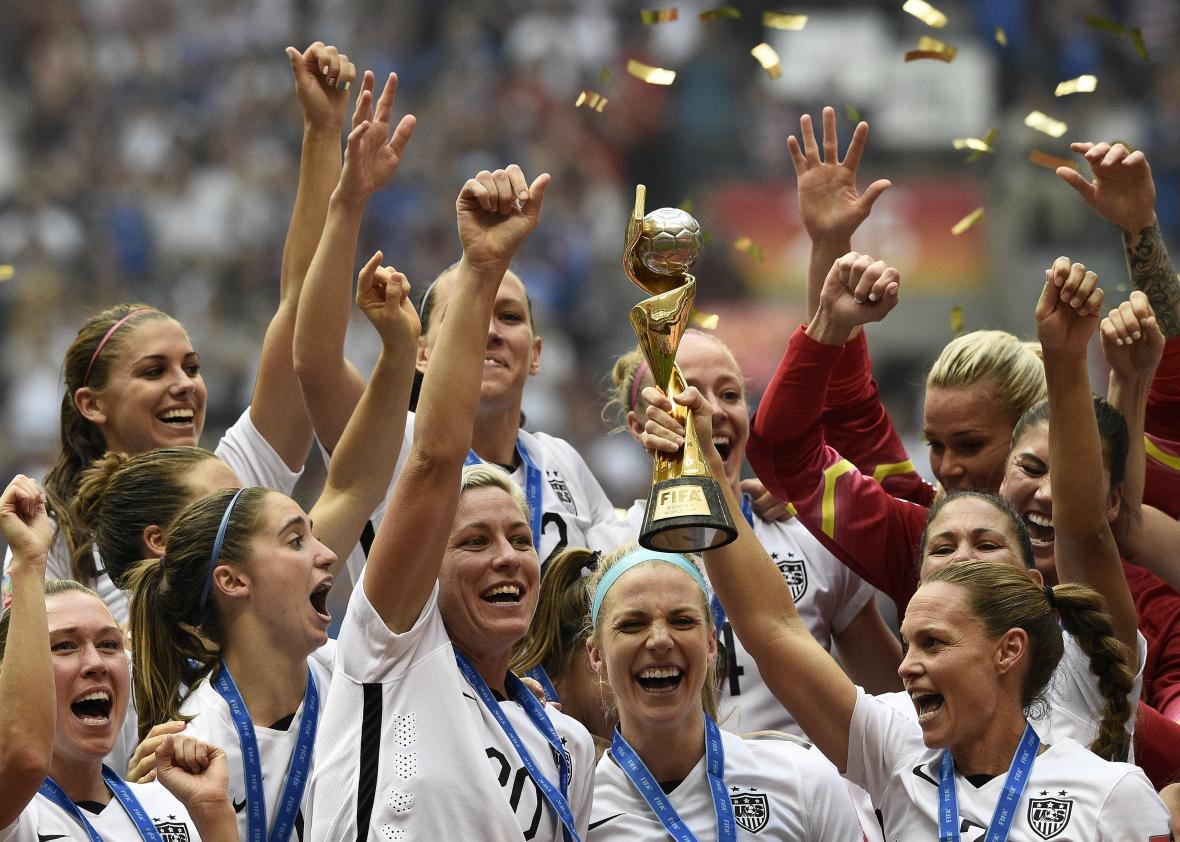Five big-name members of the U.S. women’s national soccer team filed a federal wage discrimination complaint on Wednesday, alleging that the U.S. Soccer Federation pays them up to 40 percent less than the U.S. men’s team. While the men’s team hobbles along under coach Jürgen Klinsmann, the women’s team has been raking in most of the money for U.S. Soccer with its Olympic and World Cup wins, the complaint points out.
The players who filed the action with the Equal Employment Opportunity Commission are perhaps the most recognizable members of the team: Hope Solo, Alex Morgan, Megan Rapinoe, and co-captains Becky Sauerbrunn and Women’s World Cup MVP Carli Lloyd. The five are bringing the case on behalf of all the team’s players, whose contracts make them employees of U.S. Soccer. “The numbers speak for themselves,” Solo said in a statement. “We are the best in the world, have three World Cup championships, four Olympic championships, and the [members of the U.S. men’s team] get paid more to just show up than we get paid to win major championships.”
Women’s team members make a base salary of $72,000 per year from the federation along with occasional bonuses, while men’s team members are paid differing amounts depending on the type of game and their performance. However, the guarantee of a salary is misleading in this case; the structure of the men’s payouts means that they always make much more than the women, even during a less successful season. (Sports Illustrated compared the two in a handy chart.) One of the most egregious examples: For a friendly match against a team ranked in the top 10, a women’s team member gets $1,350 for a win and nothing for a loss. For the same match, a men’s team member gets a whopping $17,625 for a win and $5,000 for a loss. The women make $75,000 each for a World Cup win; the men make around $335,000 each.
Or they would, if they ever made it that far. U.S. Soccer has maintained inequitable bonus structures, which are negotiated separately in collective bargaining agreements, for decades. In 1998, each U.S. women’s team player got a $2,500 bonus for making the World Cup team. They ended up taking home the championship. The men each got a $20,000 bonus for making their team, and finished dead last. U.S. Soccer reported a $20 million jump in national team revenue last year, which the women’s team credits to their World Cup win and the victory tour that followed. “The men’s most notable achievement in the past half-century was a quarterfinal appearance at the 2002 World Cup,” the New York Times deadpanned Thursday morning.
U.S. Soccer has resisted several recent attempts from the women’s team to renegotiate the collective bargaining agreement that expired in 2012. The federation argues that a 2013 memorandum of understanding extended the validity of that agreement to the present; the team’s union disagrees. Last month, U.S. Soccer sued the U.S. women’s national team union to prevent them from renegotiating for better pay and working conditions, like playing on all natural turf, which the men’s team does. In 2000, the Olympic and World Cup champion U.S. women’s team went on strike to protest their meager pay compared to the losing U.S. men’s team; U.S. Soccer is trying to head off a similar debacle in the lead-up to this summer’s Olympics in Rio de Janeiro.
On the TODAY show Thursday morning, Solo said “not much has changed” in the several collective bargaining agreement negotiations she’s participated in during her 15 years on the team. “We continue to be told we should be grateful just to have the opportunity to play professional soccer and to get paid for doing it,” she said. The players’ lawyer, Jeffrey Kessler, said that, according to U.S. Soccer’s numbers, the U.S. women’s team made the federation $16 million last year, while the men’s team caused a $2 million loss. The teams have “the same number of minimum friendlies, the same requirements about participating and making the World Cup teams, identical work,” he said. “But the women have without dispute vastly outperformed the men not just on the playing field but economically for the USSF.”
In a statement, the federation said it was “disappointed” that the players had filed a complaint with the EEOC. “We have been a world leader in women’s soccer and are proud of the commitment we have made to building the women’s game in the United States over the past 30 years,” it said. If the women prevail in their case, U.S. Soccer may have to hand over several million dollars in back pay.
